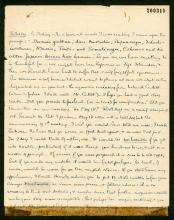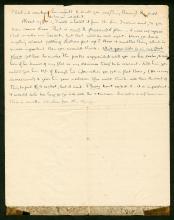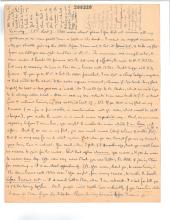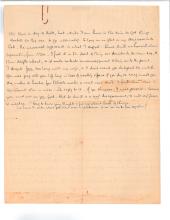BRACERS Record Detail for 19320
To access the original letter, email the Russell Archives.
"Saturday—My Darling—In a learned work I was reading I came upon this passage: 'Darwin giebtan, dass Australier, Papuaneger, Fidschi-insulaner, Maoris, Taiti- und Somalineger, Eskimos und die alten Japaner keinen Kuss kennen.'"
This letter consists of document .200315 as well as document .200320, represented in record 19323.
There are two typed transcriptions of page 1 of this letter: document .052418, record 99879; document .201119, record 116329.
Both transcriptions lack the last paragraph of the original letter.
There are no transcriptions of page two of this letter (document .200320).
Letter 42
BR TO CONSTANCE MALLESON, [20 JULY 1918]
BRACERS 19320. AL. McMaster
Previous Brixton letter, BRACERS 46926; next letter, BRACERS 19322
Edited by K. Blackwell, A. Bone, N. Griffin and S. Turcon
<Brixton Prison>1
Saturday.2
My Darling
In a learned work I was reading I came upon this passage: “Darwin giebt an, dass Australier, Papuaneger, Fidschiinsulaner, Maoris, Taiti- und Somalineger, Eskimos und die alten Japaner keinen Kuss kennen.”3 So you see we have something to be thankful for — we might have been Papuans or Fiji Islanders, and then we should have had to suffer that really frightful ignorance. This nonsense is only because I didn’t want to plunge at once into what rather disquieted me in your last:4 the inquisitive emissary from Ireland Cubitt5 (whom in future I shall call Mr. Cubitt). I hope you had a good story ready. Did you provide beforehand (or in time) for verification? Did you remember an anniversary on May 18? Birthdays are so easily verified at Somerset Ho. that I presume May 18 was not a birthday6 but the anniversary of 1st meeting. I wish you could have told me more. I read between the lines that you were a good deal upset, and so was I at first. For 2 days I could think of nothing else. It would be too horrible if you got into trouble, particularly if it was through your kindness to me, and not on a matter of principle. Of course if you were prepared it is sure to be all right, but if you made any mistake it would be fatal perhaps. The truth, of course, would be worse for you than complete silence. If you still have any apprehensions, I should strongly advise you to put the whole matter before your lawyer Macdonald7 or some wise person, and follow advice: it is so necessary to think out details, and make sure that further inquiries would make your story more acceptable. But perhaps I am worrying needlessly, and you satisfied Mr. Cubitt at his first visit. When my next letter comes, let me know somehow what you expect, and what has happened (if anything).
I shall not venture henceforth to send you anything through the post.8
About my flat: Unless you will take it,a I will inhabit it from the time I come out, and you can come there. That is much the pleasantest plan — it was only expense that made me hesitate, but that will be all right. Have you done anything about getting shelves put up?9 Here is another thing, which is more important than you would think: While your sister is in my flat10 please get her to make the porter acquainted with you as her sister, and ask him if he knows of any flat on my staircase likely to be vacant. Tell him you will give him 10/– if through his information you get a flat there, (He is very avaricious) and give him your address. You will think all this the sort of thing to put off and neglect, but it isn’t. Please don’t neglect it — it is important. It would take too long to go into all the reasons. This letter is only business — there is another elsewhere11 for other things.
Saturday (2nd sheet).
Still more about plans! You did not answer all my questions, and on some points I am a little in the dark. I want to suggest reasons why you should give up the Attic before I come out, and let it furnished, and take my flat from me till you can get another in R.C. The reasons are complicated, and come under 3 heads (1) finance (2) the best way of effecting the move to R.C. (3) the best way of ceasing to live in the same house with Miles. I will begin with (1), finance. If you go to R.C. and let the Attic furnished, I can get a cheap lodging anywhere, and that will be the whole of the extra expense incurred; whereas if I go back to my flat myself the loss is two guineas a week. Or I could go to the Studio, which we can’t hope to be always able to let. Also in case my brother relents I can come back to G. S.12 without fuss and without having my flat eating its head off. (2). If you start in my flat as my tenant (or, for a few weeks, in combination with your sister, which would be still cheaper), you make the move in a much more respectable way. And, as we were agreeing before I came here, you ought to make the move while I am here, not after. And if you are in my flat, you are much more likely to hear of another flat in R.C.b And it is very easy for me to visit my own flat when you are there, and if you are my tenant, your being there is natural. You said, when I spoke of it 2 weeks ago, that you would have no reason to give for the move. But that applies whenever you move, and you do mean to move some day. You can say now that you are letting the Attic and joining Clairc for economy — it is an ideal opportunity. (3). You mean, don’t you, to cease living in the same house with Miles soon? You ought, from every reason, to make the break before I come out — it is much better than when I am about. It is bad for both you and Miles being together. And people will talk less unkindly if you leave him while I am in than if you do it later. Remember our discussion before I came in.
All this is dry and dull, but while I am here is the time to get things started as they are to go ultimately. So long as no flat on my staircase is to let, the nearest approach is what I suggest. Don’t think me horrid about separating from Miles. I feel it is the sort of thing one decides to do some day, and then drifts about, and it needs outside encouragement to bring one to the point. I stayed far too long with my wife,13 and I don’t want you to repeat the mistake. You will pay all your life long in loss of vitality and force if you do, and every month you stay makes it harder for Miles to make a real new start. I feel sure what I say about this is wise. Do reply to it — if you disagree, I won’t press it — because you must act as you feel. But be sure it is a real disagreement, and not only fear and inertia. I long to know your thoughts and feelings about hosts of things.
Just heard the order about prohibited areas is withdrawn. So we can see the sea together!
All I say in this letter is rather thought than felt. I should so love to be back in my flat and to receive you there that I only desire the other plan with my reason. Do as you like best. As long as we are together I shall be happy. Nothing else matters.
Later On reflection I am full of doubts as to what I say on this sheet, but I should like to know your opinion. I should love being in my flat again myself, and having you come there.d
- 1
[document] The letter was edited from the unsigned, handwritten original in the Malleson papers in the Russell Archives. It is written on both sides but only half-way down the verso of each of the two sheets of thin, laid paper, ruled on one side and folded twice, so that there was no writing on the exposed quarter-sheets.
- 2
[date]Colette pinned the following note to the first sheet of this letter: “This letter is probably Sat. 20 July 1918. C.M.” She was probably correct.
- 3
learned work … “Darwin giebt an, dass Australier … keinen Kuss kennen.” W. von Bechterew, Objektive Psychologie: oder Psychoreflexologie die Lehre von den Assoziationsreflexen (Leipzig and Berlin: B.G. Teubner, 1913), p. 375. BR wrote “giebt” rather than “gibt” as in the source quoted. [Translation: “Darwin admits that Australians, Papuans, Fiji islanders, Maoris, Tahitians and Somalis, Eskimos and the ancient Japanese do not know how to kiss.”] Von Bechterew is referring to a passage in Darwin’s book, The Expression of the Emotions in Man and Animals: “We Europeans are so accustomed to kissing as a mark of affection, that it might be thought to be innate in mankind; but this is not the case. Steele was mistaken when he said ‘Nature was its author, and it began with the first courtship.’ Jemmy Button, the Fuegian, told me that this practice was unknown in his land. It is equally unknown with New Zealanders, Tahitians, Papuans, Australians, Somals of Africa, and the Esquimaux” (2nd ed. [London: John Murray, 1901], pp. 225–6). Darwin footnoted the Steele quotation: “Sir J. Lubbock, Prehistoric Times, 2nd edn., 1869, p. 552, gives full authorities for these statements. The quotation from Steele is taken from this work.” Russell’s library has the 1901 edition of Darwin’s book.
- 4
your last Colette’s letter of 15 July 1918 (BRACERS 113141).
- 5
inquisitive emissary from Ireland Cubitt BR was making an oblique reference to an unnamed Scotland Yard detective who visited Colette on 16 July 1918 to ask about the Personals placed by G.J. in The Times. “Ireland” evokes “Scotland”, and a “cubit” is a length (that of a forearm) not too unlike a “yard”, which explains the name BR chose as a substitute for “Scotland Yard”. There were eight such secret messages, the first printed on 7 May, the last on 27 June. This method of communication was abandoned once the method of smuggling letters in the uncut pages of books was seen to be successful. Colette dismissed the inquiry, writing that “that sort of thing is quite usual nowadays” and that she expected “no further bother”. She even joked that, “If he expected to find Lenin and Co. in Attic <as they nicknamed her flat>, he must have been surprised to find only me” (BRACERS 113141). Either Colette toned down her reaction when editing the typescript, or a message from her about the incident was lost, or both parties were over- or underreacting. Cubitt is not as unusual a name as it might seem. William Cubitt (1765–1861) devised the infamous prisoner treadmill at Brixton, c.1820.
- 6
May 18 was not a birthday It was BR’s birthday. G.J.’s message of “many happy returns today” appeared in The Times that day (BRACERS 96081). BR hoped Colette had told Scotland Yard that it was an anniversary so the date would not be linked to him.
- 7
Macdonald Colette’s otherwise unidentified lawyer.
- 8
to send you anything through the post This remark indicates that BR’s visitors took the letters out of the books and mailed them, at least some of the time, instead of conveying the books in their entirety — probably because the books would have contained letters for more than one person. The letters were put into wrappers to identify recipients (Letter 56). BR decided to abandon the post because Colette may have been under surveillance by Scotland Yard.
- 9
shelves put up? In Letter 35, BR mentioned that he had 1,500 books and asked Colette to find a place in his flat for them.
- 10
your sister is in my flat The artist Clare Annesley (1893–1980) had sublet BR’s Bury Street flat from Helen Dudley at the end of May 1918.
- 11
another elsewhere In the same book that contained this letter or another one.
- 12
G. S.BR’s brother’s London home at 57 Gordon Square, W.C.1.
- 13
stayed far too long with my wife Alys Russell, née Pearsall Smith (1867–1951), an American Quaker. She and BR had married in 1894. Their marriage foundered in 1901–02, but they did not formally separate until ten years later. They did not divorce until 1921. Alys did not visit BR in prison, but before his appeal she made contact with their acquaintance, former President of the Aristotelian Society and Secretary of State for War 1905–12, Lord (Richard Burton) Haldane (1856–1928), in support of giving BR first-division status (see BRACERS 57341).




